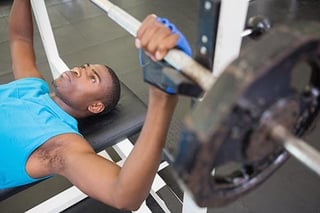The Alaska Club focuses on Men’s Health and dedicates the month of July to raising awarenes s. It’s all about early detection of diseases and improving physical and mental health for men nationally. Yet, keeping healthy is an all-year endeavor. Here are 11 tips for the other months that aren’t Men’s Health Month.
s. It’s all about early detection of diseases and improving physical and mental health for men nationally. Yet, keeping healthy is an all-year endeavor. Here are 11 tips for the other months that aren’t Men’s Health Month.
- Take a Run for Men’s Health - The Alaska Men’s Run on July 16th is a great reminder that preventing prostate and testicular cancer doesn’t have to be a pain in the butt. Now in it’s 21st year, the Alaska Men’s Run raises awareness of cancers and promotes early detection and treatment.
- Schedule regular visits to your doctor - the most contributing factor to poor health for men in the United States isn’t scarfing double bacon cheeseburgers, chugging Coors Light, or the daily Netflix binge: it’s neglect. Neglecting a visit to the doctor is one of the most dangerous behaviors a man can do. A quick, exam can go a long way to prevent serious health issues. Don’t have a doctor? Your health insurance provider is a good place to start or ask a friend, family member, or colleague.
- Exercise every week - before you begin or modify any exercise you currently do, you should consult a doctor—see Tip #2. A doctor can help you figure out a safe level of activity for you and give you advice. According to the CDC, adults need at least 150 minutes of moderate-intense aerobic activity and twice a week muscle-strengthening activities. Don’t like brisk walking and lifting weights? There are plenty of other strength training options available. Ask a Personal Trainer at The Alaska Club or sign-up for a fitness consultation at any staffed location.
- Track your weight - there’s still debate on weighing in every week or every day. The important thing is to step on the scale regularly and record the reading. It’s a regular maintenance check and can reveal patterns in health. Keep in mind that body weight can fluctuate even hour-to-hour and it’s more important to look at trends than day-to-day data. Wi-Fi enabled scales can make tracking weight a breeze, but you can definitely go old-school with a paper record.
- Take 10,000 steps/day - again, see your doctor before beginning any exercise (See Tip #3). Depending on your fitness goals, 10,000 steps may be too much to start with, but if weight loss is a goal, taking 10,000 steps each day burns 2000-3500 calories each week. Given that one pound of fat equals approximately 3500, you could lose about one pound a week. Of course, the most important step is the first step. But it’s easier than you may think. Smart phones can pull double duty as pedometers or you can get a dedicated fitness band to start tracking.
- Protect psychological health - psychological health is just as important as physical health. Usually, the two go hand and hand. Depression, stress, and other psychological issues affect physical health and often go undiagnosed for men. Men can protect against psychological issues by connecting with friends, engaging in hobbies, getting into the outdoors, and regularly discussing their psychological health with loved ones and doctors.
- Work on the Dad Bod - every bod is beautiful, but even the most fit dad bod of dad bods can use a little TLC. You don’t have to look like David Beckham, who coincidentally is a father of four, but you can certainly feel like him through regularly maintain your health and fitness.
- Get some sleep - the National Sleep Foundation recommends that adults need between seven and nine hours of sleep each night. Skipping on sleep can lead to higher risks of diabetes, obesity, cardiovascular disease, and depression. Getting enough sleep is also important for recovery after working out.
- Get the family involved - men’s health isn’t just about men. Other family members can help men get on the path to health by regularly engaging in conversation about health and showing that caring about health is the New Normal. Create a family health schedule on a daily, weekly, monthly, and yearly basis so that healthy habits become routine. Dad is more willing to visit the doctor and hit the gym if he sees the rest of the family regularly doing so.
- Reflection & wellness - regular meditation, yoga, or reflection can help to reduce the stress hormone cortisol. Too much stress means too much cortisol, which can lead to lower immunity, increased blood pressure, and decreased muscle tissue. There are many ways to reduce stress levels and yoga is a great option. Join a class or bring a friend to Yoga In The Park, sponsored by The Alaska Club each Wednesday night in Anchorage during the summer.


